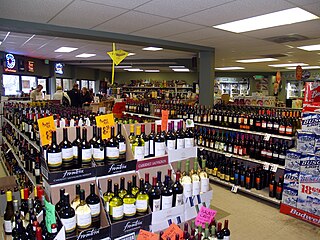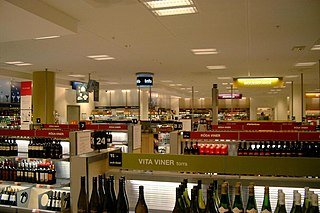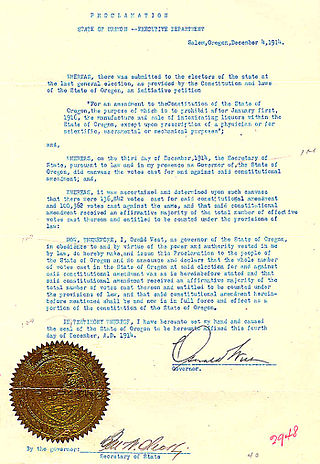Related Research Articles

An alcopop is any of certain mixed alcoholic beverages with relatively low alcohol content, including:
- Malt beverages to which various fruit juices or other flavorings have been added
- Wine coolers: beverages containing wine to which ingredients such as fruit juice or other flavorings have been added
- Mixed drinks containing distilled alcohol and sweet liquids such as fruit juices or other flavourings

The Liquor Control Board of Ontario (LCBO) is a Crown corporation that retails and distributes alcoholic beverages throughout the Canadian province of Ontario. It is accountable to the Legislative Assembly through the minister of finance. It was established in 1927 by the government of Premier George Howard Ferguson to sell liquor, wine, and beer. Such sales were banned outright in 1916 as part of prohibition in Canada. The creation of the LCBO marked an easing of the province's temperance regime. By September 2017, the LCBO was operating 651 liquor stores.

A liquor store is a retail shop that predominantly sells prepackaged liquors – typically in bottles – usually intended to be consumed off the store's premises. Depending on region and local idiom, they may also be called an off-licence, off-sale, bottle shop, bottle store or, colloquially, bottle-o, liquor store or other similar terms. A very limited number of jurisdictions have an alcohol monopoly. In US states that are alcoholic beverage control (ABC) states, the term ABC store may be used.

The Oregon Liquor and Cannabis Commission (OLCC), formerly known as the Oregon Liquor Control Commission, is a government agency of the U.S. state of Oregon. The OLCC was created by an act of the Oregon Legislative Assembly in 1933, days after the repeal of prohibition, as a means of providing control over the distribution, sales and consumption of alcoholic beverages. To this end, the agency was given the authority to regulate and license those who manufacture, sell or serve alcohol. Oregon is one of 18 alcoholic beverage control states that directly control the sales of alcoholic beverages in the United States. In 2014, the passage of Oregon Ballot Measure 91 (2014) legalized the recreational use of marijuana in Oregon and gave regulatory authority to the OLCC.
Alcoholic beverage control states, generally called control states, less often ABC states, are 17 states in the United States that, as of 2016, have state monopoly over the wholesaling or retailing of some or all categories of alcoholic beverages, such as beer, wine, and distilled spirits.

The Alberta Gaming, Liquor and Cannabis Commission (AGLC) is an agency of the government of the Canadian province of Alberta, and regulates alcoholic beverages, recreational cannabis, and gaming-related activities. References to cannabis were added to AGLC's name and governing legislation as cannabis in Canada moved towards legalization in 2018. AGLC was created in 1996 as the Alberta Gaming and Liquor Commission by combining the responsibilities and operations of the Alberta Liquor Control Board (ALCB), Alberta Lotteries, the Alberta Gaming Commission, Alberta Lotteries and Gaming and the Gaming Control Branch. The current Chief Executive Officer as of 2020 is Kandice Machado.
The New Jersey Division of Alcoholic Beverage Control is an agency of the government of the state of New Jersey that regulates commerce in alcoholic beverages in that state.

Alcohol Beverage Services, previously known as the Department of Liquor Control is a government agency within the County of Montgomery, Maryland and is the wholesaler of beer, wine and spirits alcoholic beverage throughout the county's 507-square-mile (1,310 km2) area. Montgomery County Department of Liquor Control also exercises control over retail sales for off-premises consumption, either through government-operated package stores or designated agents.
The Washington State Liquor and Cannabis Board, formerly the Washington State Liquor Control Board, is an administrative agency of the State of Washington. The Liquor and Cannabis Board is part of the executive branch and reports to the Governor. The board's primary function is the licensing of on and off premises establishments which sell any type of alcohol, and the enforcement and education of the state's alcohol, tobacco, and cannabis laws.
A liquor license is a governmentally issued permit to sell, manufacture, store, or otherwise use alcoholic beverages.

An alcohol monopoly is a government monopoly on manufacturing and/or retailing of some or all alcoholic beverages, such as beer, wine and spirits. It can be used as an alternative for total prohibition of alcohol. They exist in all Nordic countries except Denmark proper, and in all provinces and territories in Canada except Alberta. In the United States, there are some alcoholic beverage control states, where alcohol wholesale is controlled by a state government operation and retail sales are offered by either state or private retailers.
The Virginia Alcoholic Beverage Control Authority is one of the eleven public safety agencies under the Secretariat of Public Safety and Homeland Security for the Commonwealth. The agency administers the state's ABC laws. ABC stores are the only retail outlets in Virginia where customers may purchase distilled spirits. The profits that Virginia ABC contributes are collected from sales of distilled spirits at ABC stores, taxes collected on beer and wine sales, violation penalties and license fees. Since its establishment in 1934, Virginia ABC has contributed more than $9 billion to the Commonwealth's general fund. Virginia ABC employs more than 4,000 people statewide.

Alcohol laws of New York are a set of laws specific to manufacturing, purchasing, serving, selling, and consuming alcohol in the state of New York. Combined with federal and local laws, as well as vendor policies, alcohol laws of New York determine the state's legal drinking age, the driving under the influence limit, liquor license requirements, server training, and more.

The alcohol laws of Pennsylvania contain many peculiarities not found in other states, and are considered some of the strictest regulations in the United States.

The U.S. state of Oregon has an extensive history of laws regulating the sale and consumption of alcoholic beverages, dating back to 1844. It has been an alcoholic beverage control state, with the Oregon Liquor and Cannabis Commission holding a monopoly over the sale of all distilled beverages, since Prohibition. Today, there are thriving industries producing beer, wine, and liquor in the state. Alcohol may be purchased between 7 a.m. and 2:30 a.m for consumption at the premise it was sold at, or between 6 a.m. and 2:30 a.m. if it is bought and taken off premise. In 2020, Oregon began allowing the sale of alcohol via home delivery services. As of 2007, consumption of spirits was on the rise while beer consumption held steady. That same year, 11% of beer sold in Oregon was brewed in-state, the highest figure in the United States.

Alcohol laws are laws in relation to the manufacture, use, being under the influence of and sale of alcohol or alcoholic beverages that contains ethanol. Common alcoholic beverages include beer, wine, (hard) cider, and distilled spirits. The United States defines an alcoholic beverage as "any beverage in liquid form which contains not less than one-half of one percent of alcohol by volume", but this definition varies internationally. These laws can restrict those who can produce alcohol, those who can buy it, when one can buy it, labelling and advertising, the types of alcoholic beverage that can be sold, where one can consume it, what activities are prohibited while intoxicated., and where one can buy it. In some cases, laws have even prohibited the use and sale of alcohol entirely, as with Prohibition in the United States from 1920 to 1933.
Blue laws, also known as Sunday laws, are laws that restrict or ban some or all activities on specified days, particularly to promote the observance of a day of rest. Such laws may restrict shopping or ban sale of certain items on specific days. Blue laws are enforced in parts of the United States and Canada as well as some European countries, particularly in Austria, Germany, Switzerland, and Norway, keeping most stores closed on Sundays.

The production of distilled spirits in New Jersey has not been a large industry in the state. Strict alcoholic beverage control laws in place during and after Prohibition (1919–1933) prevented the industry from growing for almost a century. In 2013, the state passed a law creating a craft distillery license. and issued the first new distillery license since Prohibition to Jersey Artisan Distilling
References
- ↑ "Beer & Wine: North Carolina ABC Commission". Archived from the original on 2006-04-27. Retrieved 2006-04-20.
- ↑ "Spirituous Liquor: North Carolina ABC Commission". Archived from the original on 2006-04-28. Retrieved 2006-04-20.